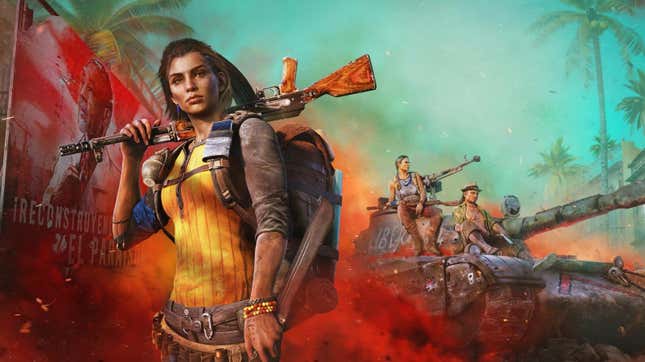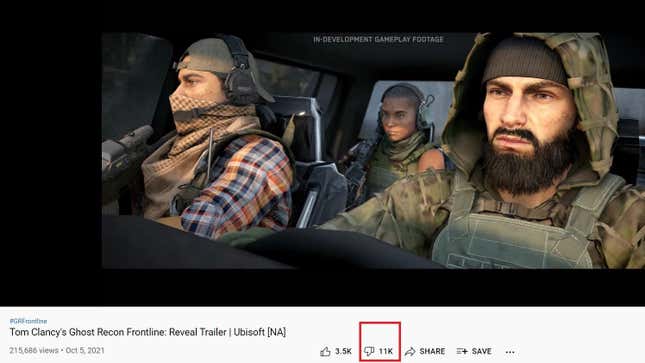
Assassin’s Creed Valhalla was one of last year’s best games and, arguably, a homerun moment in a multi-year project to transform the action stealth series into a full-fledged open-world RPG that could measure up to its genre-defining rivals. Everywhere else, however, Ubisoft seems to be hitting singles or striking out.
Far Cry 6 launched today, and by most accounts, it appears to be more Far Cry. That’s certainly a welcome thing for some people. Game Informer described it as a “nonstop thrill ride” and gave it a nine out of 10. IGN was similarly impressed, calling it the best the series has been in a decade.
“Even after this many games, the job of turning all the red dots on your map into blue ones is still a good time,” reads its review.
But other critics have been far less generous, seemingly exhausted with just how much the game leans into the well-trodden excesses of the modern-day Ubisoft map game.
“It’s like being blasted by a fire hose, only to be asked, ‘How’d the water taste?’” reads the Washington Post’s review in-progress. “Far Cry 6 is a bland entry in a series in need of a revolution,” declared Video Game Chronicle.
Waypoint was even more direct.
“’Far Cry 6' is creatively and morally bankrupt,” reads the headline. “This isn’t a review of ‘Far Cry 6’ because, honestly, I can’t play this shit anymore,” wrote Matthew Gault. “I just can’t do it.”
He explained:
It was fun when I did [it] the first time in Far Cry 3, which came out in 2012. It was a little better but the same when I did it in Far Cry Primal. It was entirely boring and unnecessary when I did it in Far Cry 5. The fact that Far Cry 6 thinks it can essentially deliver the exact same game a decade later is just depressing.
Far Cry 6’s Metacritic score, an inconsequential number in the larger scheme of things but one companies still treat as more science than bullshit, currently hovers in the high 70s. It’s been slipping lower with almost each new entry in the series, down from the roughly 90 achieved with Far Cry 3 nearly a decade ago. In some ways, it feels like the only thing that still distinguishes the series from every other Ubisoft game is how it tackles ambitious political issues only to inevitably fumble them. Far Cry 6 may go on to sell gangbusters just as Far Cry 5 did, but the critical consensus is clearly pining for something less predictable. (Kotaku’s review is still forthcoming).

This comes the same week that Ubisoft revealed Ghost Recon: Frontline, a live service multiplayer game that appears to be aimed at no one in particular. It’s the third battle royale the company has worked on and the third free-to-play shooter it’s announced this year. Frontline is part of Ubisoft’s pivot to more “high-end” freemium releases. Fans were not impressed.
As it did with The Division: Heartland before it, YouTube viewers downvoted the new Frontline trailer by the thousands. The Ghost Recon subreddit collectively lost its shit.
“It’s incredible to me how tone deaf Ubisoft has become,” wrote one poster. “To be clear: nobody in the community wanted a battle royale.”
Frontline’s announcement comes two years after the disastrous release of Ghost Recon: Breakpoint, a game containing the DNA of every other Ubisoft franchise seemingly designed to appeal to everyone, thus exciting almost no one. Internally, the failure prompted a reevaluation of the creative vision guiding Ubisoft’s disparate assemblage of IP. In early 2020, CEO Yves Guillemot announced new editorial vice presidents to help oversee game development across all of its studios, but we know how that turned out.
All of them were men. Some of them were eventually accused of sexual misconduct and other abuses, including then-longtime chief creative officer Serge Hascoet. As Ubisoft confronted a wave of allegations of workplace malfeasance throughout last year, it announced new vice presidents and, most recently, a new chief creative officer, Igor Manceau, formerly a director on the upcoming Riders Republic.
Ubisoft’s treatment of its developers is inseparable from the company’s creative output. It says it’s meaningfully improved on the former, though hundreds of current and former employees dispute that. When it comes to the latter, it’s too early to tell. Games take a long time to make, and ones like Far Cry 6 and 2022’s Rainbow Six: Extraction began development years before the company’s latest reckoning. Business as usual clearly isn’t an option, though.